


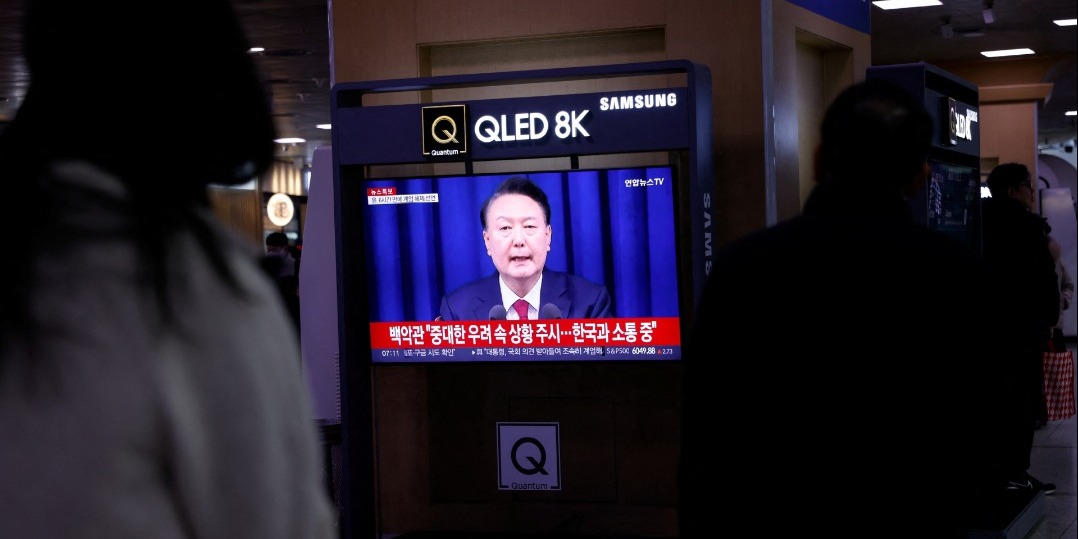
S. Korea's snap presidential election expected to be held on June 3: media
President Yoon Suk-yeol was removed from office on April 4 after the country's Constitutional Court, in a unanimous decision, upheld a parliamentary vote to impeach him over the Dec 3 martial law decree.
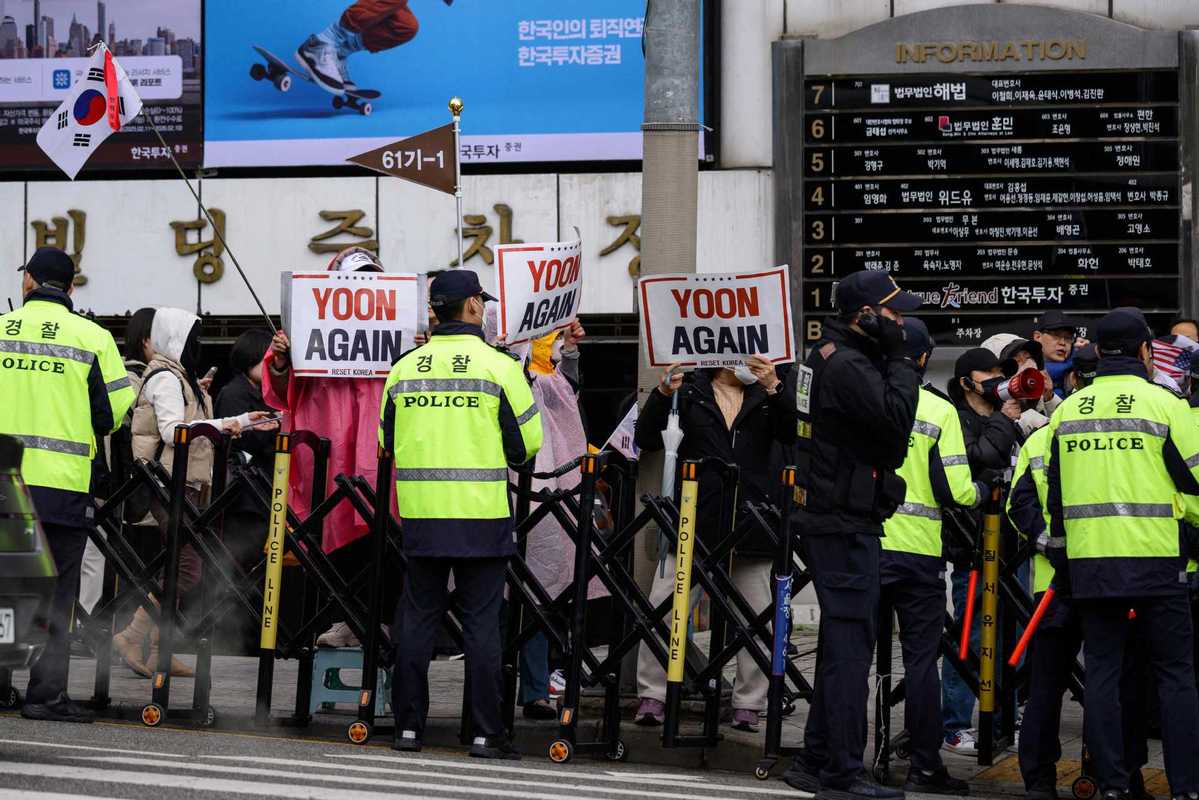
Tense exchanges inside the Seoul Central District Court featured the first hearing of the criminal trial of former South Korean president Yoon Suk-yeol on Monday amid insurrection charges following his short-lived martial law declaration in December.
The prosecution presented a summary of its charges during the trial, while Yoon, a former top prosecutor, refuted them one by one and stressed that the martial law only lasted for a few hours, according to Yonhap News Agency.
"It goes against legal principles to build an insurrection case based on an indictment that looks like a printout of an incident that lasted only a few hours and was lifted immediately in a nonviolent manner upon accepting the National Assembly's demand to lift it," said Yoon, who has become the 5th former South Korean president to stand criminal trial.
Yoon said that, even during the initial investigation process, many statements included in the indictment — by people questioned — were made out of fear and guided by the investigation agency without verification.
He was formally removed from office over his martial law declaration after the Constitutional Court upheld on April 4 his impeachment. A snap presidential election is set for June 3.
Yoon's martial law attempt lasted about six hours from 10:27 pm on Dec 3 when he made the surprise announcement in a televised address. The National Assembly voted against it at 1:02 am on Dec 4 and Yoon formally lifted the martial law about three hours later.
The prosecution said Yoon led riots with the purpose of disrupting the country's constitution by mobilizing troops and police to areas including the National Assembly, the headquarters of the main opposition Democratic Party, and the National Election Commission.
Supporters gathered outside the court holding banners such as "Yoon Again" while his opponents held a news conference calling for his rearrest.
Meanwhile, on Monday, the ruling People Power Party, or PPP, began registration for candidates for the upcoming election.
Several key figures are expected to participate in the party's primary, including former labor minister Kim Moon-soo, former Daegu mayor Hong Joon-pyo, former PPP chairman Han Donghoon, and PPP lawmaker Anh Cheol-soo.
Seoul Mayor Oh Se-hoon, who had been seen as one of the leading presidential contenders for the party, said he will not participate in the primary.
Acting President and Prime Minister Han Duck-soo has remained silent on speculation that he may run for president.
The PPP will confirm its standard-bearer on May 3.
The liberal Democratic Party, or DP, also started receiving candidate registrations on the same day. But the party has decided there will be no open primary and the candidate will be selected by combining voting by party members and public opinion polls resulting in a 50:50 ratio. The final candidate will be confirmed on April 27.
Former DP leader Lee Jaemyung is a front-runner in opinion polls, maintaining a solid lead of 48.8 percent as a preferred presidential candidate in a weekly poll released on Monday by Realmeter.
Lee announced last week his policy road map if he becomes president, saying that he would focus on overcoming the national crisis in politics and economy.
Former labor minister Kim Moon-soo came next with 10.9 percent, followed by 8.6 percent for Han, the acting president.
As for party approval ratings, DP gained 46.7 percent, up 1.9 percentage points from the previous week. PPP had 33.1 percent, down 2.6 percentage points.
Economic instability
"The political turmoil from an early election triggered by the impeachment of former president Yoon Suk-yeol, combined with worsening external economic situation due to US tariffs, has heightened economic instability," Realmeter said in its report.
This has increased public anxiety, fueling dissatisfaction with the government and the ruling party, which resulted in a negative impact on PPP's approval ratings, it said.
Yoon's next hearing is scheduled for April 21, with experts saying the trial is likely to be a lengthy one.
"The first verdict is likely to be delivered around August, but the case involves around 70,000 pages of evidence and numerous witnesses. So if deemed necessary by the court, the trial may be extended," lawyer Min Kyoung-sic told AFP.
Agencies contributed to this story.
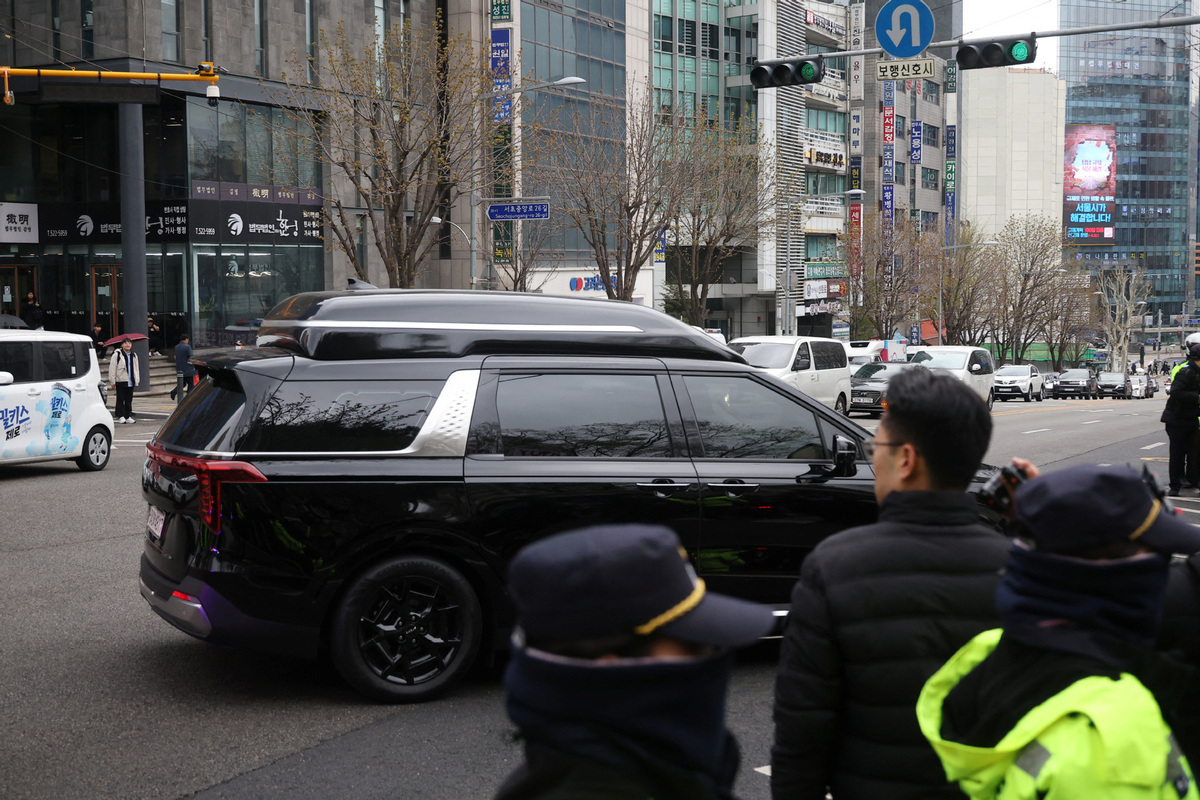
SEOUL -- South Korea's ousted President Yoon Suk-yeol attended his first criminal trial on Monday on insurrection charges.
Yoon, carried by a black vehicle, arrived at the Seoul Central District Court at around 9:48 am local time (0048 GMT) and entered the courtroom via the court's underground parking lot in a bid to avoid public exposure, local media footage showed.
During the first formal hearing, Yoon reportedly denied his insurrection charges and defended himself by testifying in the courtroom for about 80 minutes. The second hearing was scheduled for April 21.
On April 4, the constitutional court upheld a motion by parliament to impeach Yoon over his short-lived martial law imposition.
With the court's decision, the conservative leader officially lost all presidential power, becoming the country's second elected president to be forcibly removed from power.
Yoon declared an emergency martial law on the night of Dec 3, 2024, but it was revoked by the opposition-led National Assembly hours later.
The impeachment motion against Yoon was passed in parliament on Dec 14, 2024.
Yoon was apprehended in the presidential office on Jan 15 and was indicted under detention on Jan 26 as a suspected ringleader of insurrection, becoming the country's first sitting president to be arrested and prosecuted.
If convicted of being the insurrection ringleader, Yoon could face the death penalty or life imprisonment.
He was released on March 8 as the prosecution decided not to appeal against a court's release approval.
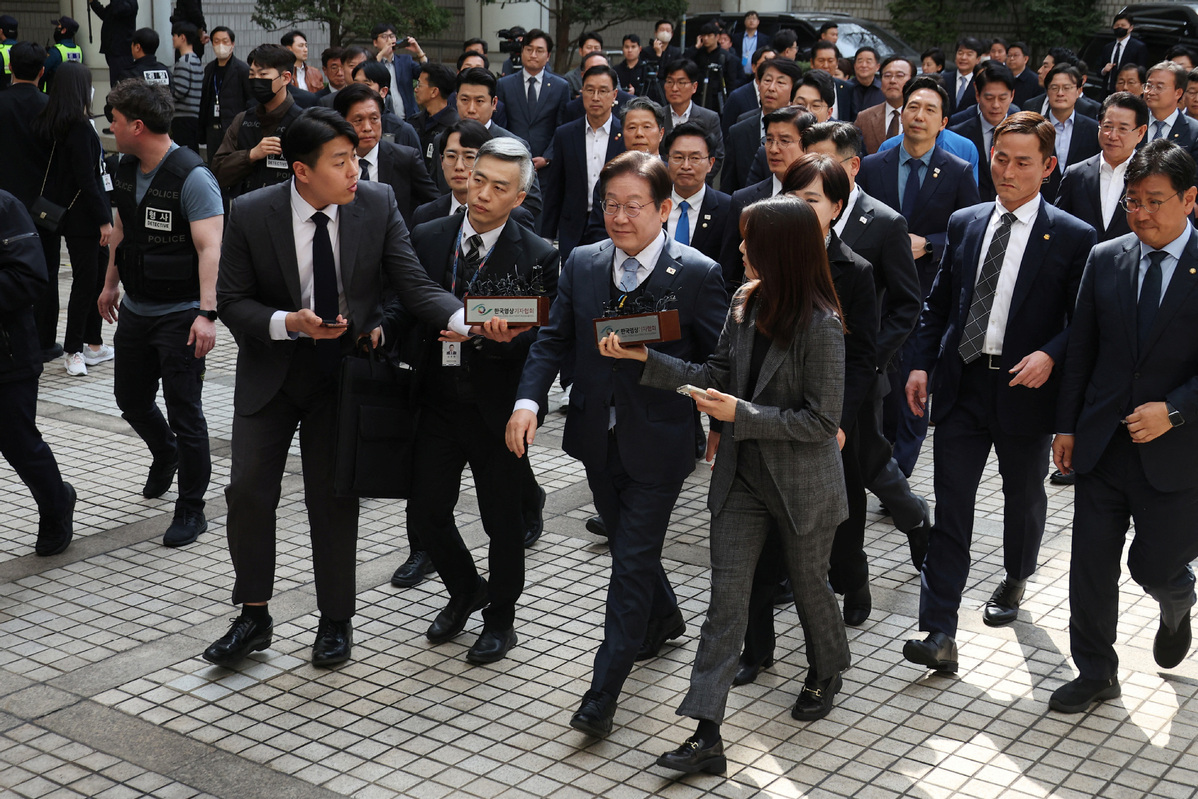
SEOUL -- Lee Jae-myung, ex-leader of South Korea's main liberal opposition Democratic Party, announced his bid for a snap presidential election via a video message on Thursday.
Lee resigned as party leader on Wednesday amid widespread expectations for his presidential run.
A snap presidential election was set for June 3 following the constitutional court's removal of former President Yoon Suk-yeol from office on April 4 over Yoon's short-lived martial law imposition last December.
Lee, who lost the 2022 presidential election to Yoon by the country's narrowest margin, had been broadly seen as the most powerful contender for the snap election.
According to a survey by local pollster Flower, 49.6 percent said they will vote for the Democratic Party's candidate in the next presidential election, while 29.5 percent were in favor of the ruling People Power Party's candidate.
Lee was the most favored as the Democratic Party's presidential candidate with a support rate of 85.5 percent.
The result was based on a poll of 3,004 voters conducted from March 17 to 20. It had a plus and minus 1.8 percentage points in margin of error with a 95 percent confidence level.
SEOUL -- Lee Jae-myung, chief of South Korea's main liberal opposition Democratic Party, resigned as party leader on Wednesday amid wide expectations for his presidential run.
Lee said at the party's supreme council meeting that he was grateful to party members, officials and lawmakers for achievements during his three-year party chairmanship.
The most-favored presidential hopeful noted that he would start something new soon, indicating his declaration to run for president in the near future.
He stressed that the difficulties people were currently experiencing would be overcome quickly by the help of "great DNA," with which people overcame the past hardships, pledging that he would be with people in the process.
A snap presidential election was set for June 3 following the constitutional court's removal of former President Yoon Suk-yeol from office on April 4 over his short-lived martial law imposition last December.
Lee, who lost the 2022 presidential election to Yoon by the narrowest margin, had been broadly viewed as the most powerful contender for the snap election.
According to a survey by local pollster Flower, 49.6 percent said they will vote for the Democratic Party's candidate in the next presidential election, while 29.5 percent were in favor of the ruling People Power Party's candidate.
Lee was the most favored as the Democratic Party's presidential candidate with a support rate of 85.5 percent.
The result was based on a poll of 3,004 voters conducted from March 17 to 20. It had plus and minus 1.8 percentage points in margin of error with a 95-percent confidence level.
SEOUL -- South Korea's snap presidential election was widely expected to be held on June 3 after former President Yoon Suk-yeol's ouster from office last week, multiple media outlets, including Yonhap news agency, said Monday.
An unidentified government official was quoted by Yonhap, local daily Chosun Ilbo and other media as saying that the date of the election will be confirmed at the scheduled cabinet meeting on Tuesday.
Yoon was removed from office with the constitutional court's unanimous ruling on Friday to uphold his impeachment motion by the National Assembly.
By law, an acting president is required to designate the date of a presidential election in 10 days and hold the snap election in 60 days after a president's removal.
Yoon declared an emergency martial law on the night of Dec 3, 2024, but it was revoked by the opposition-led National Assembly hours later.
The impeachment motion against Yoon was passed in the parliament on Dec 14, 2024, and he was indicted on Jan 26 as a suspected ringleader of insurrection.
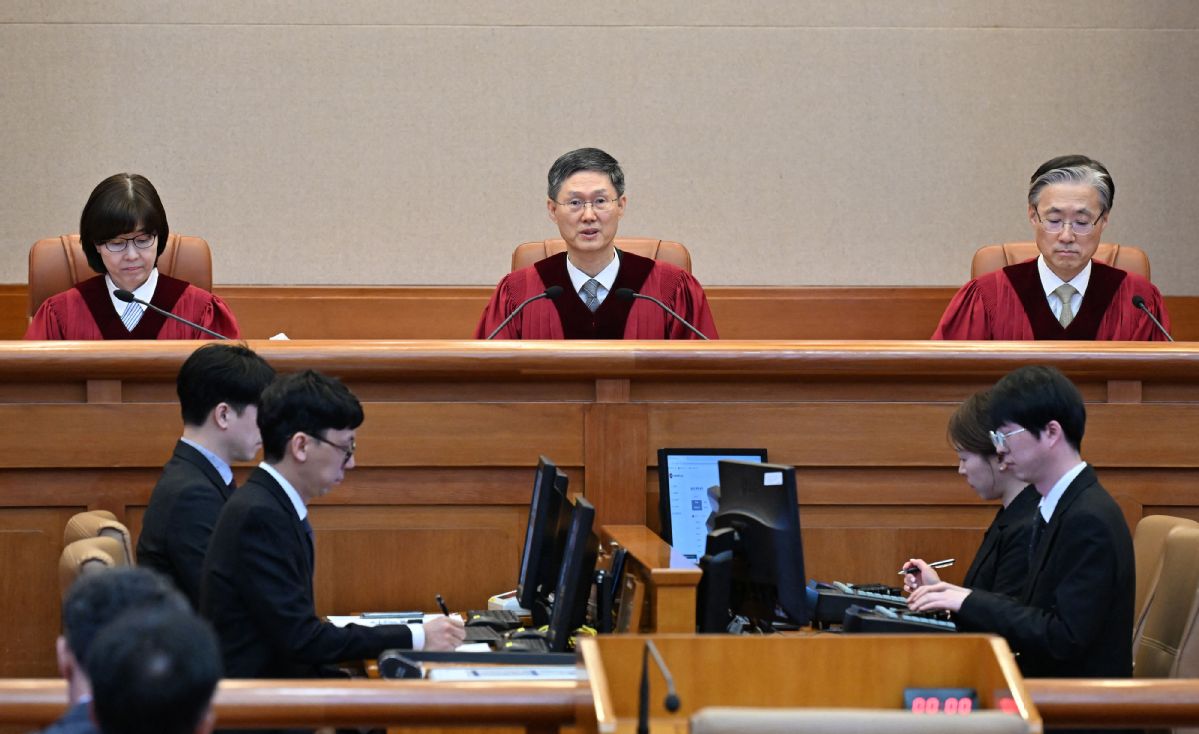
The whole of South Korea heard the decisive voice of Moon Hyungbae, acting chief of the Constitutional Court, announce live at 11:22 am on Friday: "Ruling: Respondent President Yoon Suk-yeol is hereby removed from office."
The verdict capped months of political chaos that divided the nation, and followed a unanimous decision by the eight justices of the country's Constitutional Court to uphold a motion by the nation's parliament to impeach Yoon over his short-lived imposition of martial law in December.
The ruling ends Yoon's presidency after just two years and 11 months, but opens the door to the next national election, as an early presidential election must be held within 60 days, or no later than June 3.
"The confirmation of impeachment will help stabilize this country," said Wang Son-taek, an adjunct professor at Sogang University in Seoul. "The message in the court's ruling was powerful and precise."
Acting President Han Duck-soo, who is also prime minister, said he will ensure that there is no vacuum in national security or foreign affairs and that public order is maintained, according to Yonhap News Agency.
"I will do my utmost to oversee a smooth and fair presidential election," said Han, who also called for "political neutrality" in government agencies to guarantee a fair snap election.
Han is obligated to announce the election date by April 14, because the date for an election to fill a presidential vacancy must be announced at least 50 days in advance, according to South Korea's law.
National Assembly Speaker Woo Won-shik emphasized the need for swift governance coordination to prevent a political vacuum amid the upcoming election and to ensure a smooth transition for the new administration. Woo also urged all parties to refrain from divisive rhetoric and resolve political polarization.
Yoon declared martial law on the evening of Dec 3 but lifted it six hours later after the opposition-led National Assembly voted to reject it and later approved an impeachment motion for the top court to confirm or deny.
Recognizing all charges against Yoon, including violating the Constitution by declaring martial law and sending troops to the National Assembly, the Constitutional Court said Yoon's "unconstitutional and illegal acts betrayed the trust of the people and constituted a serious violation of law that cannot be tolerated from the perspective of protecting the Constitution".
Moon said Yoon's violations have severely damaged the constitutional order, with the benefits of upholding the Constitution far outweighing the costs of removing the president.
Yoon, who did not attend the verdict session in person, said he was deeply sorry and regretful that he had failed to meet the people's expectations.
"It has been a tremendous honor to serve the nation," Yoon said in a message through his legal team. "I will continue to pray for our beloved Republic of Korea and its people."
Yoon became the second sitting South Korean president to be ousted by the Constitutional Court, after former president Park Geun-hye. The decision marked the longest impeachment deliberation — 111 days — in the country's history.
Wang, of Sogang University, said that the ruling will change the political landscape of South Korea, with the opposition party now in a compelling position in the next election.
Yet the adjunct professor said polarization will remain as a key challenge for the South Korean people and politicians.
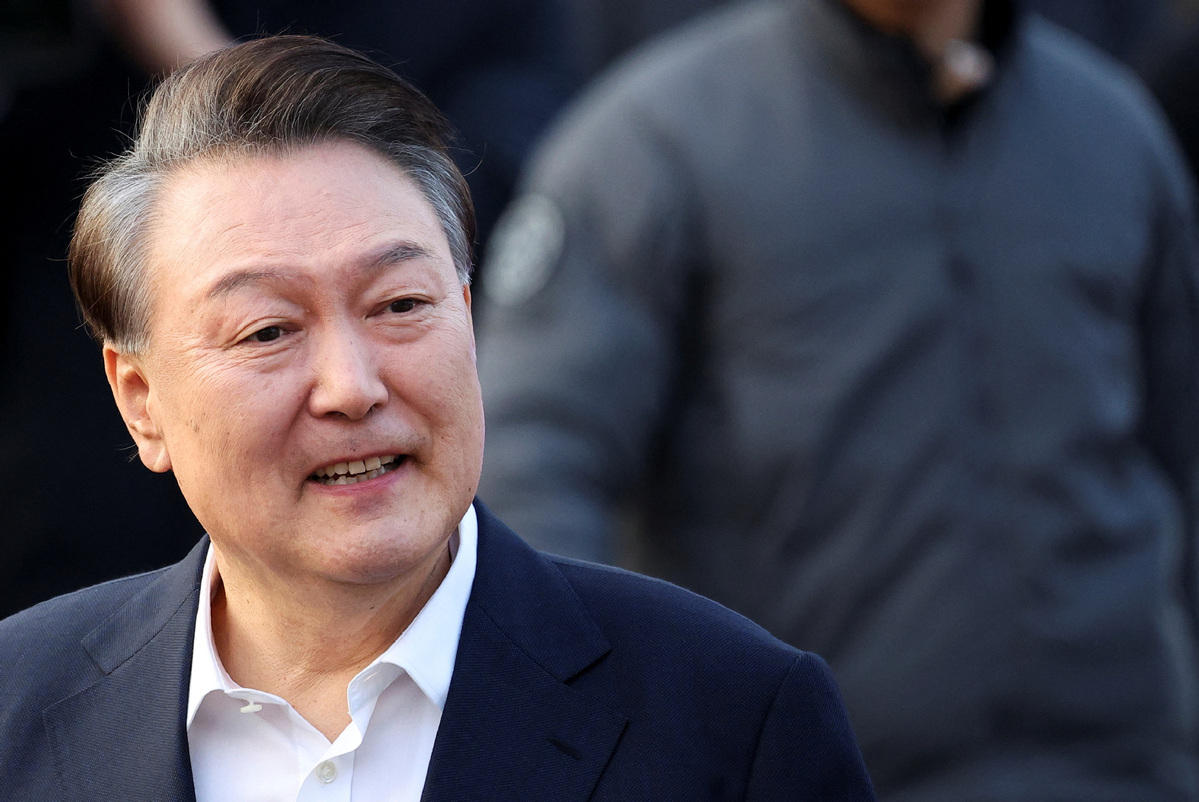
South Korean President Yoon Suk-yeol was removed from office on April 4 after the country's Constitutional Court, in a unanimous decision, upheld a parliamentary vote to impeach him over the Dec 3 martial law decree.
According to South Korean law, Yoon will be immediately removed from office and an early presidential election must take place within 60 days.
Reading the verdict in the court with a live broadcast, Moon Hyung-bae, acting chief of the Constitutional Court, dismantled every justification Yoon provided for imposing martial law.
"The negative effects on the constitutional order and the repercussions from the defendant's violations of the law are grave, making the benefits of protecting the Constitution by dismissing the defendant larger than the national losses from dismissing the president by an overwhelming degree," Moon said, as quoted by the Yonhap News Agency.
Yoon declared martial law on Dec 3 evening. Just six hours later, it was revoked by the opposition-led National Assembly.
A motion to impeach Yoon was passed in the National Assembly on Dec 14, and the constitutional court held 11 hearings on Yoon's impeachment. Yoon attended eight hearings but did not attend the verdict session.
Earlier in the day, South Korean police issued the highest alert level, mobilizing all police forces to maintain public order. Some 20,000 personnel from 338 units were dispatched nationwide, with around 14,000 of them placed in Seoul.
Around 7,500 personnel were deployed near the Constitutional Court, Gwanghwamun, and the surrounding Jongno area.
The ruling came 111 days after the case was filed, making it the longest presidential impeachment case in South Korea's history.
In previous cases, the court took 63 days to reinstate former president Roh Moo-hyun in 2004, and 91 days to remove Park Geun-hye in 2017.
SEOUL -- South Korea's constitutional court will decide whether to impeach President Yoon Suk-yeol on April 4, the court said Tuesday.
The ruling on Yoon will be delivered at 11:00 am local time (0200 GMT) on Friday and it will be broadcast live, the court said in a statement.
The police will issue the highest level of emergency order to deploy about 20,000 riot policemen of 338 units across the country for expected protests and crowd control on Friday.
Of the total, about 14,000 riot policemen will be deployed in Seoul, where the constitutional court is located.
On that day, detectives will be placed inside the court, and if protesters break into the court, they will be caught red-handed.
Police commandos as well as paramedics and ambulances will also be on standby around the court to prepare for emergencies.
Yoon declared an emergency martial law on the night of Dec 3, 2024, but it was revoked by the opposition-led National Assembly hours later.
A motion to impeach Yoon was passed in the National Assembly on Dec 14, 2024, and since then the constitutional court held 11 hearings on Yoon's impeachment.
Yoon was apprehended in the presidential office on Jan 15 and was indicted under detention on Jan. 26 as a suspected ringleader of insurrection, becoming the country's first sitting president to be arrested and prosecuted.
He was released on March 8 as the prosecution decided not to appeal against a court's release approval.

A South Korean appeals court on Wednesday acquitted main opposition leader Lee Jae-myung of an election law violation, reducing the risk that he may not run in a potential early presidential election.
After a session of about 100 minutes, the Seoul High Court overturned a ruling by a lower court in November that handed Lee a one-year sentence, suspended for two years, Yonhap News Agency reported.
Lee, leader of the Democratic Party, or DP, was charged with breaking the country's election law by making false statements about a real estate development project in Seongnam during the 2022 presidential election campaign. He served as mayor of the city near Seoul in 2010-18.
Following the ruling, Lee's supporters and DP lawmakers cheered outside the court. Demonstrators in the opposing camp protested against the ruling and some were reduced to tears.
"I would like to thank the court for delivering a proper ruling based on truth and justice," Lee said.
Instead of concentrating on his trial, Lee said there should be more focus on preventing wildfires that continue to ravage the country's southeast regions, or improving people's lives.
The ruling gained wide attention as Lee is considered the DP's most likely candidate in an early presidential election if President Yoon Suk-yeol's impeachment is upheld.
The Constitutional Court has 180 days to decide whether to remove or reinstate Yoon, who was impeached in December by the opposition-led National Assembly over his brief martial law declaration that triggered turmoil in the country.
If Yoon is removed from office, an early election must be held within 60 days.
Although prosecutors can appeal to the Supreme Court on the Lee verdict, he has largely resolved judicial risks of being disqualified from the next presidential election.
'Deep regret'
Kwon Seong-dong, floor leader of the ruling People Power Party, expressed deep regret over the court's ruling.
Kwon said he believed prosecutors would appeal against the verdict so the Supreme Court could make its judgment and end the legal controversy.
The ruling in Lee's case would have no effect on Yoon's impeachment trial because it is an independent case, he said.
"The DP should not expect the public sentiment toward it to change," said Shin Dong-uk, spokesman for the People Power Party, noting that Lee has four prior convictions and is still facing 12 charges and five trials.
DP chief spokesman Cho Seungrae said the ruling was fair and just. He asked the ruling party to accept the court's decision.
"We also urged the Constitutional Court to set the date (for Yoon's impeachment trial) as soon as possible," Cho said. "People are eagerly waiting for the chaos to end."
In a Facebook post, Park Joomin, a DP lawmaker, said the ruling represented a victory for common sense and justice.
"The verdict on (Yoon's) impeachment is the only thing left," Park wrote.
It has been a month since the Constitutional Court concluded the final hearing of Yoon's impeachment trial.
The ruling on former president Roh Moo-hyun's case was delivered 14 days after the hearings concluded, and it took 11 days for a ruling in former president Park Geun-hye's case to be delivered.
Observers initially expected the Yoon ruling to come in mid-March, but the court has not announced a date yet.
Considering that the court typically announces a verdict date two to three days in advance for security and preparation reasons, the ruling could be pushed back to next month.
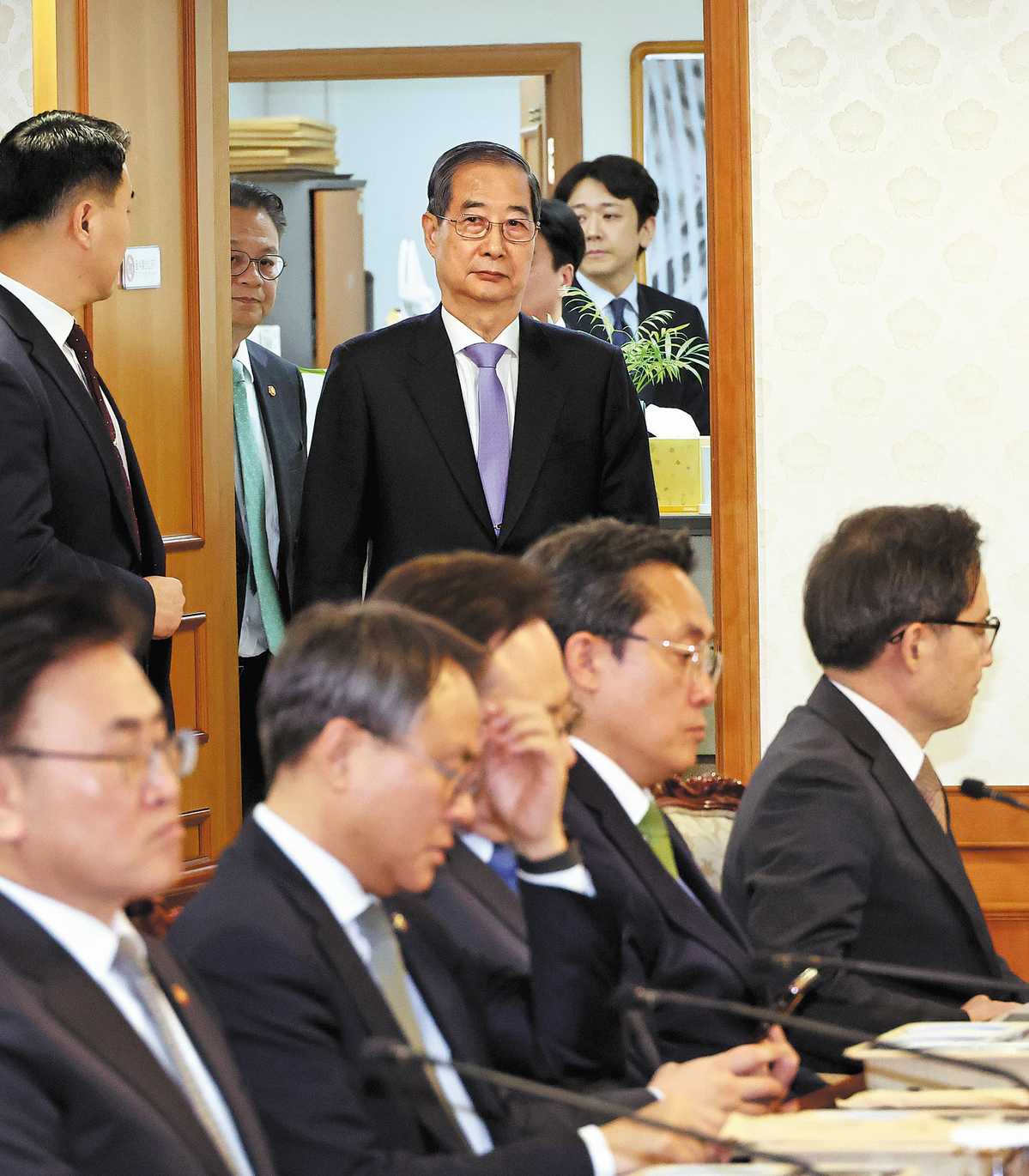
South Korea's Prime Minister Han Duck-soo has been reinstated as acting president after the country's Constitutional Court dismissed a motion for his impeachment 87 days after the motion was filed.
The motion was dismissed in a five-to-one vote by the court's eight justices on Monday.
The ruling overturned the National Assembly's motion to impeach Han on Dec 27, less than two weeks after he took over from President Yoon Suk-yeol, who was impeached following his short-lived imposition of martial law on Dec 3.
The five justices who voted to dismiss the motion said there was a lack of evidence to support the claim that Han violated the Constitution or the law concerning martial law, a court statement said.
One justice voted to uphold Han's impeachment, and two others said the impeachment motion was invalid because the quorum in the assembly did not meet the required two-thirds majority, or 200 votes, that applies when a president is impeached.
The opposition-led parliament submitted the motion after Han refused to appoint three more justices to the Constitutional Court that will preside over Yoon's impeachment trial.
The nine-member bench now has only eight justices because one has yet to be appointed by the country's acting president.
Though Han's refusal to appoint Constitutional Court justices was deemed unconstitutional, the court statement said there was a lack of evidence to suggest it "was motivated by an intent or purpose to incapacitate the Constitutional Court "in Yoon's impeachment trial.
Therefore, "it could not be concluded that the respondent had betrayed the trust of the people" to remove him from office, the court said.
With the court's ruling taking effect immediately, Han was directly reinstated as prime minister and acting president.
In a televised speech, Han vowed to protect South Korea's interests amid a global trade war initiated by the US. A deeply divided society can satisfy no one, Han said, and the government and the political parties need to change.
"I sincerely ask for bipartisan cooperation between the ruling and opposition parties so that the Republic of Korea can once again leap forward and overcome the current crisis."
The National Assembly Speaker Woo Won-sik said he respected the Constitutional Court's decision on Han's impeachment trial and called for Han to immediately appoint the ninth justice, Yonhap News Agency reported.
'Stern warning'
The ruling People Power Party said the verdict is "a stern warning from the judiciary against excessive legislative violence by the opposition party", which holds a majority in the assembly.
The interim leader of the PPP, Kwon Young-se, said he believes the ruling over Han's impeachment case will not have a direct impact on Yoon's impeachment case as the two are separate issues.
Park Chan-dae, floor leader of the main opposition Democratic Party, said the Constitutional Court should immediately deliver its ruling on Yoon's impeachment trial.
The ruling on Han's impeachment marked the beginning of a critical week in South Korean politics.
An appeal by the main opposition leader Lee Jae-myung against his conviction for election law violations, which will determine his eligibility for future presidential elections, is set for a verdict on Wednesday.
Legal analysts said the verdict on Yoon's impeachment would closely follow Han's case and could be delivered as early as Friday.
The Constitutional Court has 180 days from Dec 14, the day it received Yoon's impeachment case, to decide whether to remove Yoon from office or restore his presidential powers.
If he is impeached, a presidential election must be held within 60 days of his exit. If the impeachment motion is dismissed, Yoon will be reinstated.
Yoon also faces a separate criminal trial on charges of leading an insurrection by declaring martial law.
The Seoul Central District Court on Monday held the second preparatory hearing of Yoon's criminal trial in Yoon's absence. The first formal hearing was scheduled for April 14.
Xinhua contributed to this story.
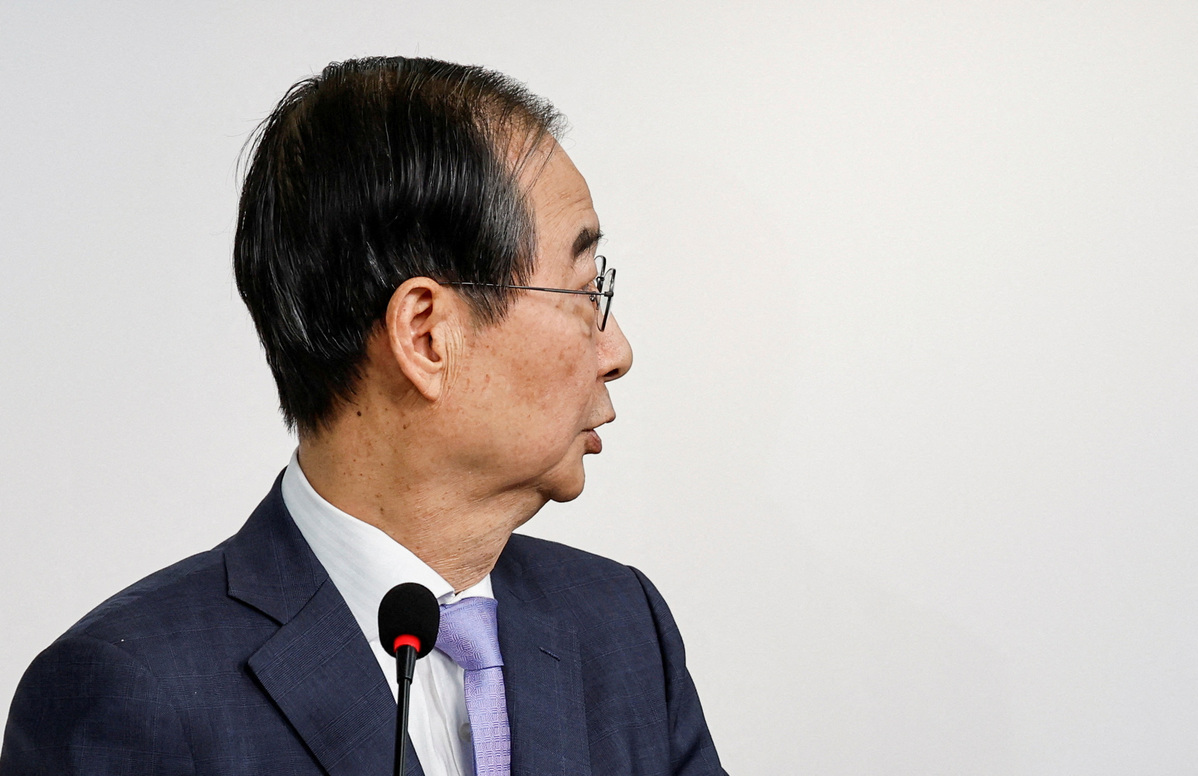
SEOUL -- South Korean Prime Minister Han Duck-soo was reinstated in his position on Monday as the constitutional court rejected a motion by the parliament to impeach him.
Moon Hyung-bae, acting chief of the court, said the motion was rejected as five justices rejected it while one upheld it amid the dismissal opinion from the remaining two.
The nine-member bench currently has eight justices as one has yet to be appointed by the country's acting president.
Despite confirmation that Han's impeachment process was legitimate, the court said neither evidence nor objective materials identified his involvement in impeached President Yoon Suk-yeol's martial law imposition and insurrection.
The court said Han's refusal to appoint constitutional court justices was unconstitutional, but it noted that evidence and objective materials failed to identify his intention to neutralize the ongoing deliberation on Yoon's impeachment.
With the rejection, Han was immediately reinstated as prime minister and acting president as the ruling took effect right after delivering the decision.
The impeachment motion against Han was passed by the opposition-controlled National Assembly on Dec. 27 last year following the impeachment of Yoon on Dec. 14 over his botched martial law imposition.
Choi Sang-mok, economy and finance minister who doubles as deputy prime minister for economic affairs, became the acting president in December last year after the impeachments of both the president and prime minister.
Yoon declared an emergency martial law on the night of Dec. 3, but it was revoked by the National Assembly hours later.
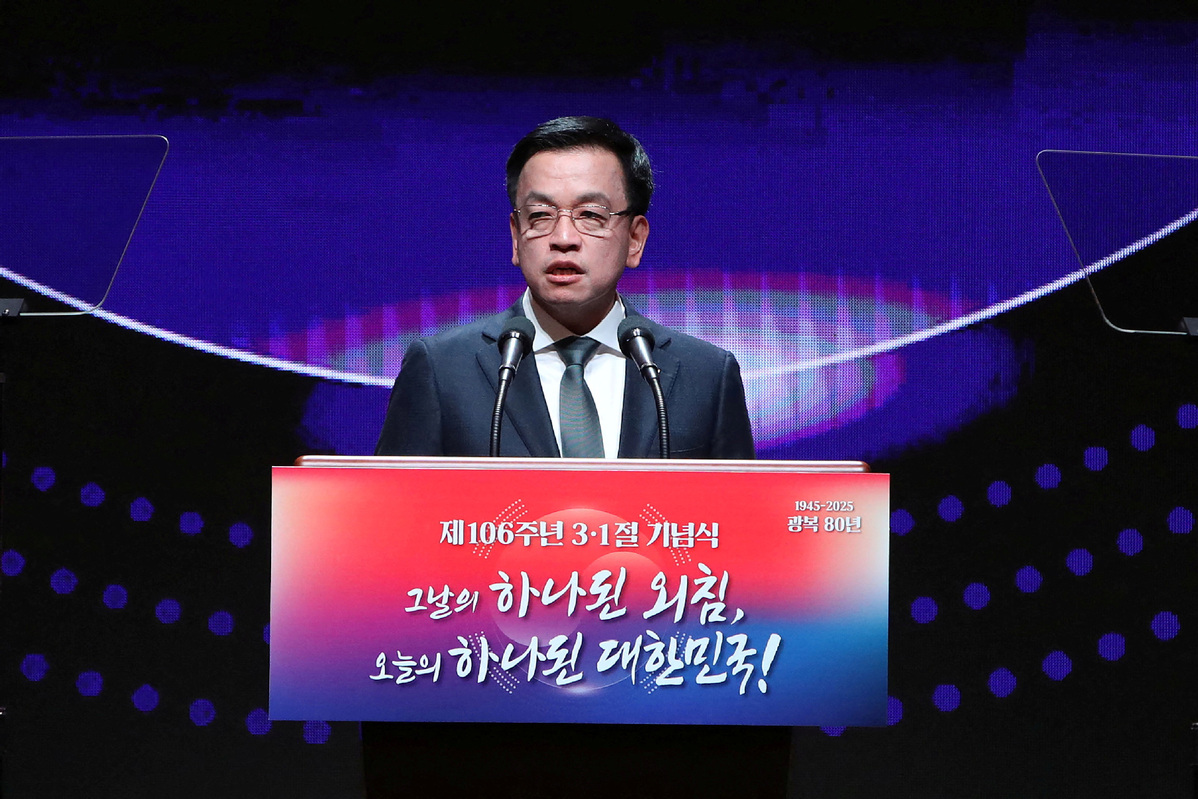
SEOUL -- South Korea's opposition parties on Friday submitted an impeachment motion against Choi Sang-mok, deputy prime minister for economic affairs who became acting president in December last year following the impeachments of both president and prime minister.
The main liberal opposition Democratic Party and four other minor parties submitted the impeachment motion for four reasons, including Choi's alleged involvement in the impeached President Yoon Suk-yeol's botched martial law imposition and his refusal to appoint a constitutional court justice for over three weeks.
Because of Choi's appointment refusal, the nine-member constitutional court currently has eight justices.
The constitutional court planned to decide whether to impeach Prime Minister Han Duck-soo on March 24.
The impeachment motion against Han was passed by the opposition-controlled National Assembly on Dec. 27 last year following the impeachment of President Yoon on Dec 14.
Yoon declared an emergency martial law on the night of Dec 3, but it was revoked by the National Assembly hours later.
SEOUL -- South Korea's constitutional court said Thursday that it will decide whether to impeach Prime Minister Han Duck-soo on March 24.
The ruling on Han will be delivered at 10:00 am local time (0100 GMT) on March 24, the court said in a statement.
The impeachment motion against Han was passed by the opposition-controlled National Assembly on Dec. 27 last year following the impeachment of President Yoon Suk-yeol on Dec 14 over his botched martial law imposition.
If the motion is rejected, Han will be reinstated, but he will be removed from office if it is upheld.
For the removal, the consent of at least six justices is required. The nine-member bench currently has eight justices.
The National Assembly listed five reasons for Han's impeachment, such as involvement in the martial law imposition, refusal to appoint three constitutional court justices, and vetoes on special counsel bills targeting Yoon and his wife, Kim Keon-hee.
Han denied the allegations, claiming that he opposed the martial law imposition.
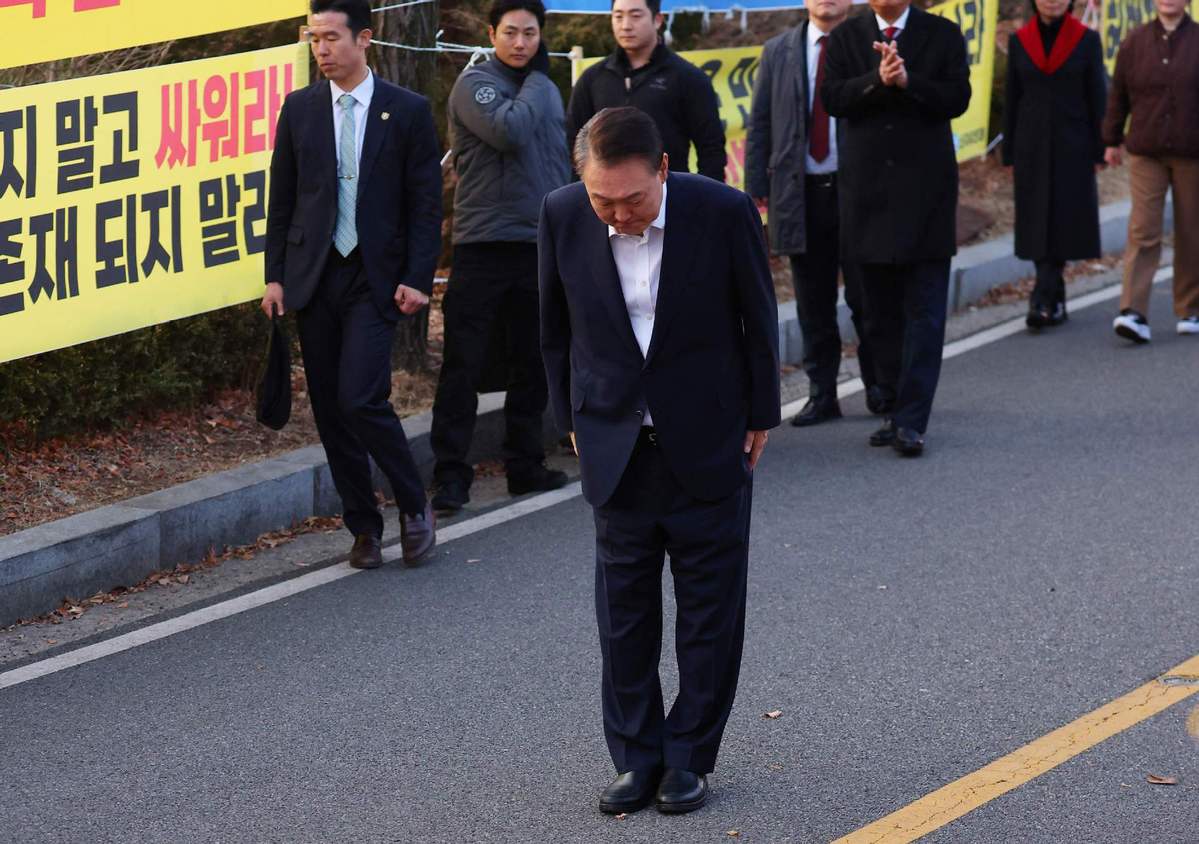
SEOUL -- The South Korean police planned to mobilize all available riot police across the country on the day when the constitutional court decides whether to impeach President Yoon Suk-yeol over his botched martial law imposition, Yonhap news agency said Wednesday.
The police will issue the highest level of emergency order to deploy about 20,000 riot policemen of 338 units across the country for expected protests and crowd control when the court reaches a conclusion on Yoon's impeachment.
Of the total, about 14,000 riot policemen will be deployed in Seoul, where the constitutional court is located.
On the day of sentencing, detectives will be placed inside the court, and if protesters break into the court, they will be caught red-handed.
Police commandos, as well as paramedics and ambulances, will also be on standby around the court to prepare for emergencies.
Yoon was released on March 8 as the prosecution decided not to appeal against a court's release approval.
The Seoul Central District Court approved the release of the arrested president, accepting Yoon's request to cancel his detention made by his legal team on Feb 4.
Yoon was apprehended in the presidential office on Jan 15 and was indicted under detention on Jan 26 as a suspected ringleader of insurrection, becoming the country's first sitting president to be arrested and prosecuted.
Yoon declared an emergency martial law on the night of Dec 3 last year, but it was revoked by the opposition-led National Assembly hours later.
A motion to impeach Yoon was passed in the National Assembly on Dec 14, and since then the constitutional court held 11 hearings on Yoon's impeachment with its final verdict widely expected to be delivered this week.
SEOUL -- A South Korean court approved the release of arrested President Yoon Suk-yeol on Friday, opening a possibility for the impeached leader to be tried without detention.
The Seoul Central District Court accepted Yoon's request to cancel his arrest, which was made by Yoon's legal team on Feb 4.
Without the prosecution's appeal, Yoon will be released, but the appeal will suspend his release until another judge of the court decides on it.
The court said the arrest cancellation is desirable to ensure a procedural clarity and dispel doubts about the investigation process, stressing that if Yoon's criminal trial proceedings are carried out with controversies left unresolved, it could lead to an annulment at a higher court or a retrial cause.
During a relevant hearing on Feb 20, Yoon's side argued that the impeached leader was indicted under detention after the expiration of the arrest warrant period, while the prosecution claimed that it was a legitimate indictment.
The court noted that the defendant Yoon was prosecuted after the expiration of his arrest period as the arrest period should be calculated based on an actual time, not by date.
Yoon was apprehended in the presidential residence on Jan 15 and was indicted under detention on Jan 26 as a suspected ringleader of insurrection, becoming the country's first sitting president to be arrested and prosecuted.
Prosecutors brought the accusation against Yoon at 6:52 pm local time on Jan 26, but the court said Yoon's arrest period expired at 9:07 am local time on the same day.
The court ruled that the Corruption Investigation Office for High-ranking Officials (CIO) has no right to investigate an insurrection case while the CIO and the prosecution divided and used the arrest period without a legal basis.
After an initial investigation, the CIO referred Yoon's insurrection case to the prosecution in January.
Yoon declared an emergency martial law on the night of Dec 3 last year, but it was revoked by the opposition-led National Assembly hours later.
A motion to impeach Yoon was passed in the National Assembly on Dec 14, and since then the constitutional court held 11 hearings on Yoon's impeachment with its final verdict widely expected to be delivered next week.
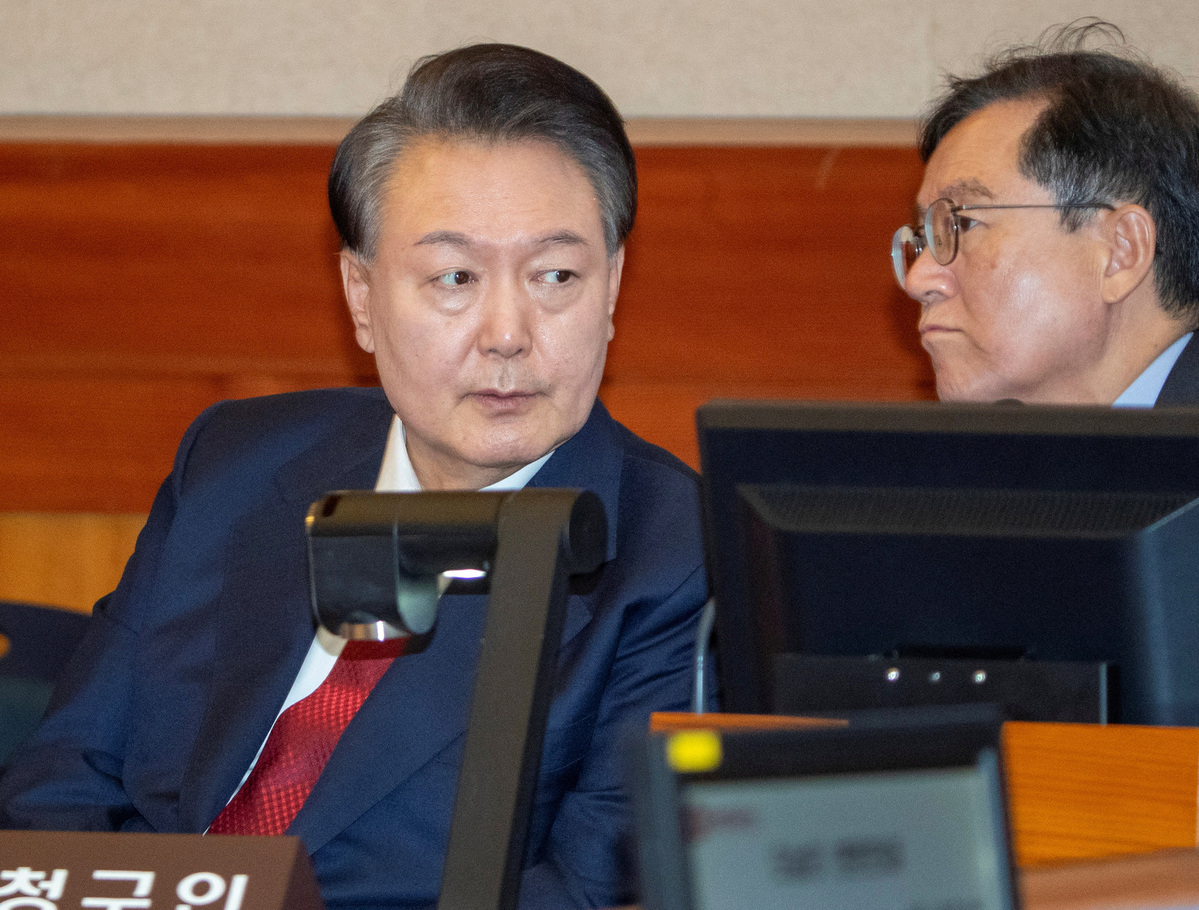
SEOUL — South Korean President Yoon Suk-yeol faced his final impeachment hearing on Tuesday before judges decide whether to remove him from office over his martial law declaration.
Yoon's brief suspension of civilian rule plunged his country into political turmoil, and he was removed from office by parliament in December.
After weeks of impeachment hearings at the Constitutional Court in Seoul, Tuesday's proceedings began at 2 pm.
In its opening remarks, Yoon's defense team cited a 2024 US Supreme Court ruling, Donald Trump versus the United States, arguing that Yoon cannot be punished for "exercising his core constitutional powers".
That ruling "should be considered in the context of impeachment proceedings", Yoon's lawyer Lee Dongchan said.
In response, opposition lawyer Lee Gum-gyu spoke about his son, an active duty soldier, who, he said, would have been forced to participate in Yoon's martial law.
"As a citizen and a father, I feel a sense of rage and betrayal toward Yoon, who tried to turn my son into a martial law soldier," he told the court.
In his final statement, Yoon said the country was facing an "existential crisis" when he declared martial law.
"It was an urgent plea for the people, as the sovereign power of this country, to recognize the situation and take action to overcome it together," he told the court.
Tuesday's session is Yoon's last before the eight judges go behind closed doors to decide his fate. A verdict is expected in mid-March.
The 64-year-old is being held at the Seoul Detention Center after he was arrested over a separate criminal case, charging him with leading an insurrection, for which he could be sentenced to life in prison or even face the death penalty.
The former prosecutor is the first sitting president to face a criminal trial, which began last week.
AGENCIES VIA XINHUA
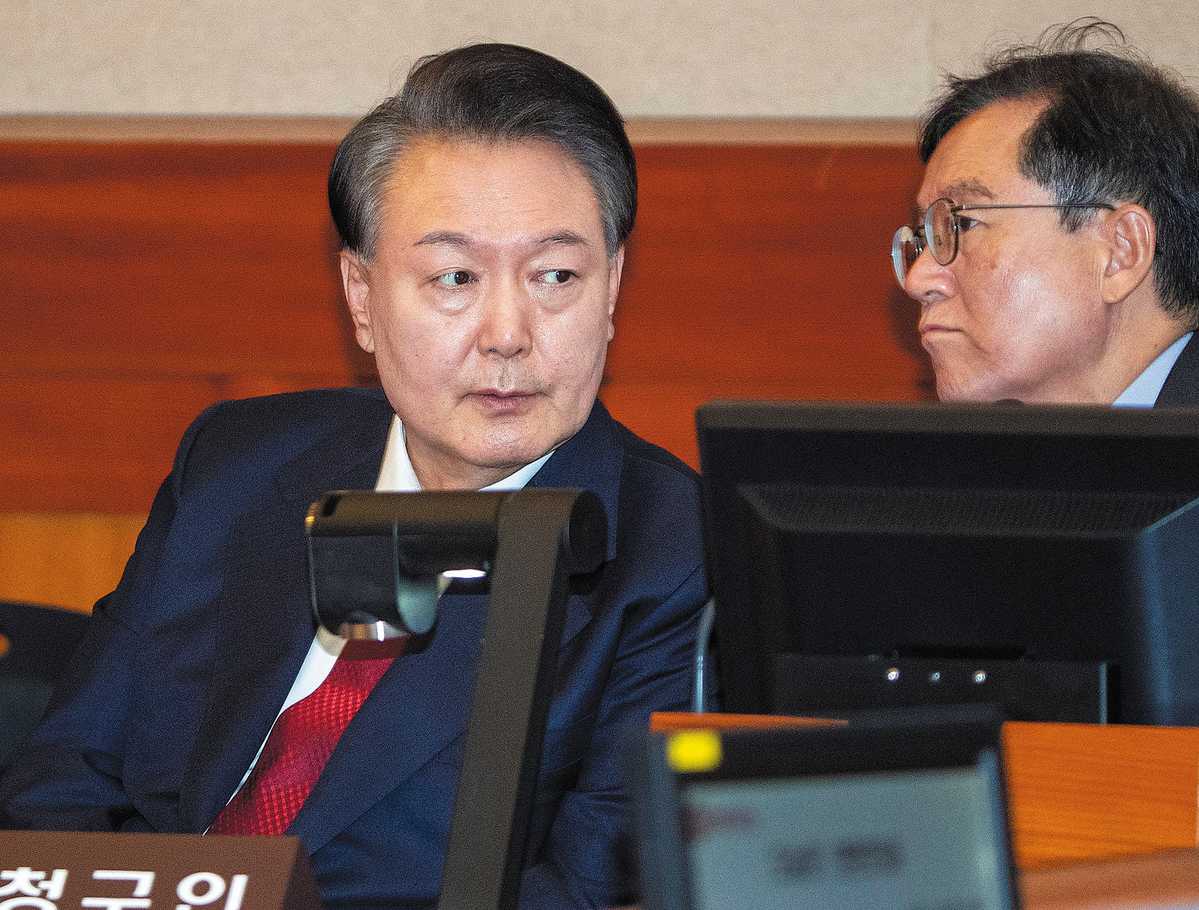
SEOUL — Ousted South Korean President Yoon Suk-yeol became the country's first sitting head of state to stand trial in a criminal case as hearings opened on Thursday regarding his bid to impose martial law.
Traveling around Seoul in a prison transport vehicle, Yoon appeared in two different courts on Thursday, contesting his arrest on rebellion charges in one and fighting an effort to remove him from office in the other. Both cases — one on criminal charges, one on impeachment — are related to his imposition of martial law.
Last month, prosecutors indicted Yoon after accusing him of leading an insurrection with his short-lived imposition of martial law on Dec 3.
Security was heightened at the Seoul Central District Court as the motorcade transporting Yoon arrived for a preliminary hearing that involved discussions of witnesses, proposed evidence and other preparations for his criminal trial.
Prosecutors called for swift proceedings considering the gravity of the case, but Yoon's lawyers said they needed more time to review records.
Yoon had "no intention to paralyze the country", one of his lawyers told the court, adding that his martial law declaration aimed to tell the public of the "legislative dictatorship of the huge opposition party".
If convicted, Yoon could face years in prison for his martial law decree, which shocked the country and sought to ban political and parliamentary activity and control the media.
The move unleashed political upheaval in Asia's fourth-largest economy, with the prime minister also impeached and suspended from power, while top military officials were indicted for their role in the matter.
The court also heard a bid by Yoon's lawyers to cancel his detention, saying the matter had been investigated in an illegal manner, and that there was no risk of Yoon trying to destroy evidence.
It was unclear when the court would rule on the detention, but a judge set the next hearing of the criminal case for March 24.
After the criminal case, Yoon also attended on Thursday afternoon a parallel impeachment trial by the Constitutional Court that has entered its final phase.
The court's acting chief justice Moon Hyung-bae said on Thursday that the next hearing will be held on Tuesday, during which Yoon and the parliament, which is presenting the case against him, will give final remarks.
On Thursday, witnesses testifying to the court included Prime Minister Han Duck-soo, who has also been impeached and awaits the court's decision on his fate.
The Constitutional Court is reviewing parliament's impeachment of Yoon on Dec 14 and will decide whether to remove him from office permanently or reinstate him.
Analysts have said a March ruling is likely.
If Yoon is removed, a new presidential election must be held within 60 days.
Agencies Via Xinhua
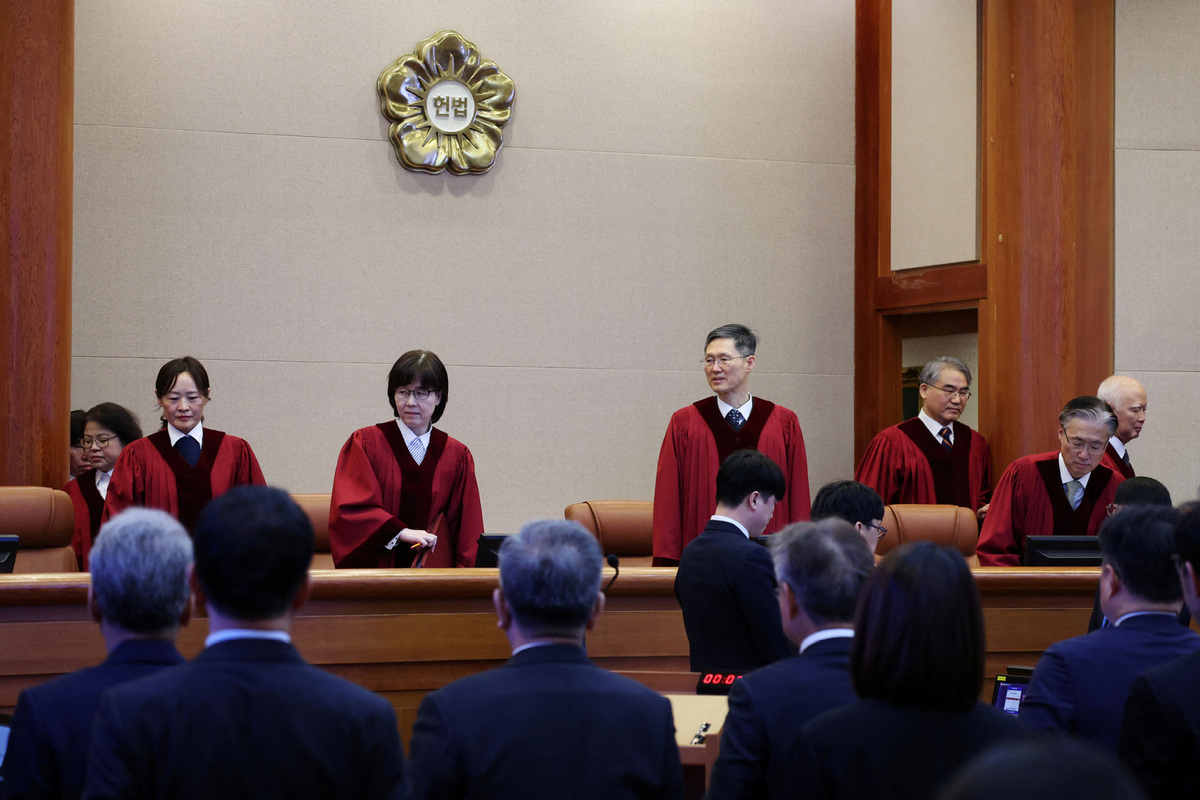
South Korean President Yoon Suk-yeol skipped the ninth hearing of his impeachment trial on Tuesday as his legal team clashed with lawyers representing the National Assembly over evidence examination.
Yoon arrived at the Constitutional Court but left for the Seoul Detention Center before proceedings began, Yonhap News Agency reported.
"After consulting with the legal representatives, it was confirmed that today's hearing involves summarizing the current situation while allowing the legal teams of both sides to present their arguments," Yoon's legal team stated. "As such, President Yoon returned to the detention center."
With no need for Yoon to directly present his opinions, he entrusted the matter to his legal team to ensure the smooth progress of the trial, his lawyers said.
Yoon faces impeachment over his short-lived martial law declaration on Dec 3 and has attended hearings since the third session on Jan 21.
During Tuesday's hearing, the National Assembly's legal team-serving as a prosecutor — and Yoon's side were each given two hours to summarize their arguments and present key evidence.
The National Assembly presented excerpts from the prosecution's interrogation of Cho Ji-ho, commissioner general of the National Police Agency.
According to Cho's testimony, Yoon had instructed him to detain all National Assembly members entering the building after he declared the martial law.
In addition, the National Assembly disclosed other investigation records related to the martial law decree, and testimonies from Cabinet members who attended the meeting convened by Yoon before the declaration.
In response, Yoon's legal representative Cho Dae-hyun said the use of testimony from individuals who had not appeared in court as witnesses is against the law, and their credibility cannot be cross-examined by Yoon's side.
"I request that they be excluded from the evidence examination," Cho Dae-hyun said.
Yoon's legal team also denied that he ordered the arrest of lawmakers and defended the necessity of martial law.
On Monday, Kwon Young-se, interim leader of the ruling People Power Party, criticized the Constitutional Court, accusing it of "rushing to make a judgment without careful deliberation".
Kwon said that while investigators summoned 520 people for questioning, the court said it could determine the whole story of martial law based on testimony from just 14 witnesses, Yonhap reported.
'Clearly a mistake'
Kwon called for a fair trial for Yoon but acknowledged that the martial law declaration was "clearly a mistake".
The final scheduled hearing is set for Thursday. Despite Yoon's request for a postponement because of a preparatory hearing for his criminal trial on charges of insurrection on the same day, the court has decided that the date will remain unchanged.
Impeached Prime Minister Han Duck-soo, National Police Agency's Cho Ji-ho, and former first deputy director of the National Intelligence Service Hong Jangwon are set to testify in the 10th hearing.
In an impeachment trial, once all witnesses have testified and all evidence has been examined, the court hears final statements from both sides before concluding proceedings.
Unless an additional hearing is scheduled, the Constitutional Court is widely expected to issue its verdict next month on whether to uphold the impeachment.
A survey published by Gallup Korea found that 57 percent of South Koreans supported Yoon's impeachment, while 38 percent opposed it.
Supporters of impeachment cited reasons such as the martial law declaration, charges of insurrection, Yoon's inability to manage state affairs, and the chaos and instability in the country.
Opponents, on the other hand, pointed to the opposition party's obstruction and impeachment attempts, as well as the legitimacy of martial law as part of the president's inherent authority.
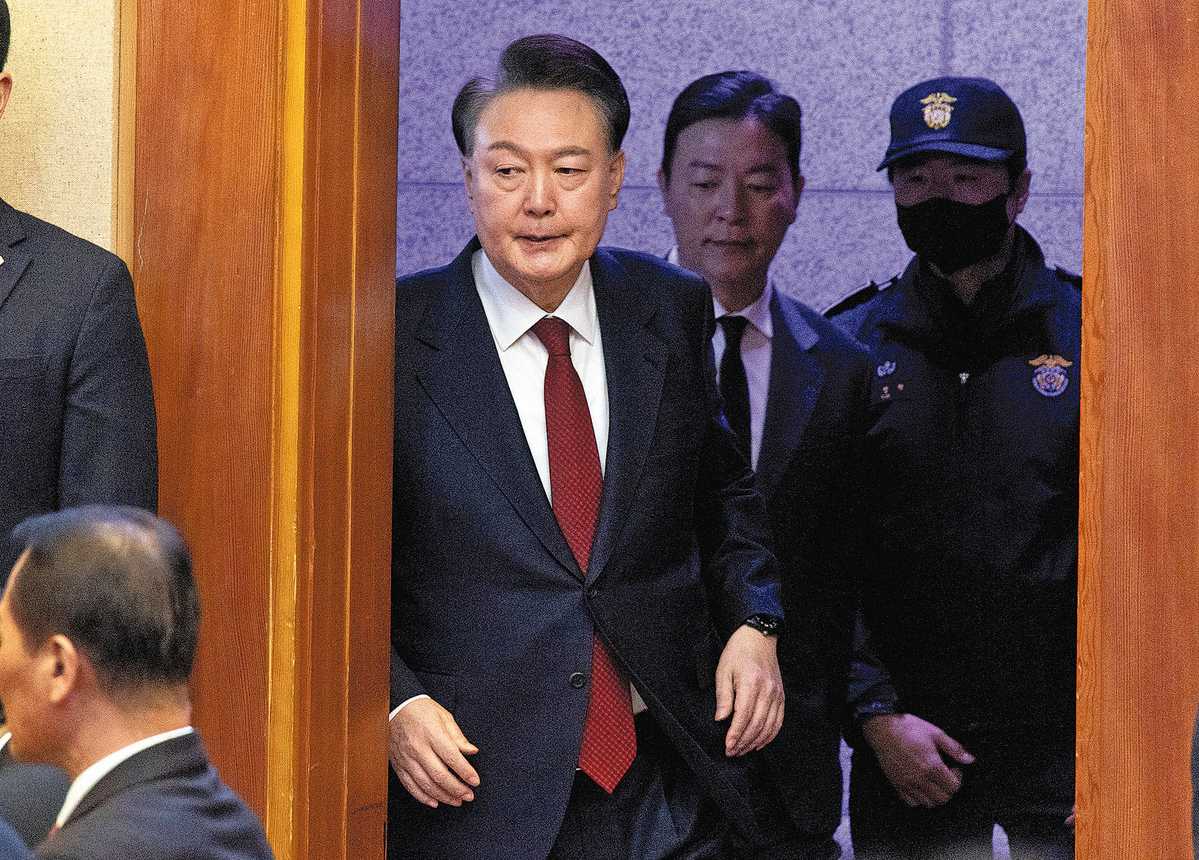
Seoul's Constitutional Court announced an additional hearing in the impeachment trial of South Korean President Yoon Suk-yeol on Tuesday, after the last designated hearing concluded on Thursday.
"We will conduct an evidence review for the records that were admitted as evidence but have not yet been examined," said Moon Hyung-bae, acting chief justice of the Constitutional Court, according to Yonhap News Agency.
Moon said the National Assembly and Yoon will both be given two hours to summarize arguments and present key points of their documentary evidence.
According to the original schedule, Thursday was the eighth and final designated hearing date for Yoon's impeachment trial.
During Thursday's hearing, Yoon's legal team accused the Constitutional Court of unlawful proceedings, warning of serious action if the impeachment trial continued in the current manner. They did not elaborate on what that action might be.
Yoon's lawyer Yun Gap-geun said the court violated the law and is conducting an unlawful and unfair trial.
"What is more important than a quick decision is a prompt, fair, accurate and politically neutral trial that the public can trust, as this is what gives meaning to the existence of the Constitutional Court," said Yun.
The team requested once again to call impeached Prime Minister Han Duck-soo as a witness.
Yoon was impeached by the National Assembly on Dec 14 over his short-lived martial law decree earlier in the month. He has since been suspended from office, and was arrested on Jan 15.
Witnesses questioned in the eighth hearing were the Chief of the National Intelligence Service Cho Tae-yong, the former chief of the Seoul Metropolitan Police Agency Kim Bong-sik, and the Head of the First Security Command of the Capital Defense Command Cho Sung-hyun.
The National Assembly's legal team — which is serving as a prosecutor in the impeachment trial — said the acts by Yoon's side undermined the court's credibility.
Song Doo-hwan, an attorney from the National Assembly's impeachment committee, said the facts regarding the trial have been clarified to a considerable degree, and he believes it is the right time for a constitutional assessment of whether the martial law declaration and the actions that followed were unconstitutional and illegal.
The timing of the verdict depends on whether the court accepts additional witnesses requested by Yoon's side and schedules more hearings, said Cho Hee-kyoung, a law professor at Hongik University in Seoul.
If no further hearings are held, a verdict could come as early as the end of this month or early March, she told China Daily.
The Constitutional Court said it would decide on Friday whether to admit additional witnesses.
"If there are more hearing dates, then the verdict will be pushed back accordingly," Cho said.
In the previous presidential impeachment trials in South Korea, the ruling was delivered in 91 days for former president Park Geun-hye and 63 days for former president Roh Moo-hyun. Those decisions were announced about two weeks after oral arguments ended.
Insurrection charges
Local media also reported that the first preliminary hearing for Yoon's criminal case on charges of leading an insurrection is scheduled for Thursday.
A simultaneous court hearing will take place to review Yoon's request to cancel his detention.
Currently, Yoon is only indicted on charges of insurrection as he is a sitting president, but he will lose presidential immunity and will likely be charged with additional crimes once the impeachment motion is upheld by the court, said Cho.
"Yoon will be in his element in the criminal trial and will use every tactic he can to challenge the indictment and the court and the judges and to draw out the proceedings," said Cho, who expects a prolonged criminal trial.
A survey released on Thursday showed that 58 percent of South Korean residents polled agreed the Constitutional Court should uphold Yoon's impeachment, while 38 percent said it should be dismissed.
The number of respondents who said Yoon should be removed from office through impeachment increased by 3 percentage points from the previous week, while 54 percent of respondents said they trusted the process of the impeachment trial, up 2 percentage points from last week.
The latest National Barometer Survey was jointly conducted by four research institutes from Monday to Wednesday, polling 1,001 South Korean residents aged over 18.
The suspended president's supporters have gathered outside the court throughout his weekslong trial.
Yoon's legal team announced it would officially launch a "citizen defense team" of supporters seeking to "save" him and have him reinstated. According to the lawyers, 15,000 people have applied to join the team.
Agencies contributed to this story.
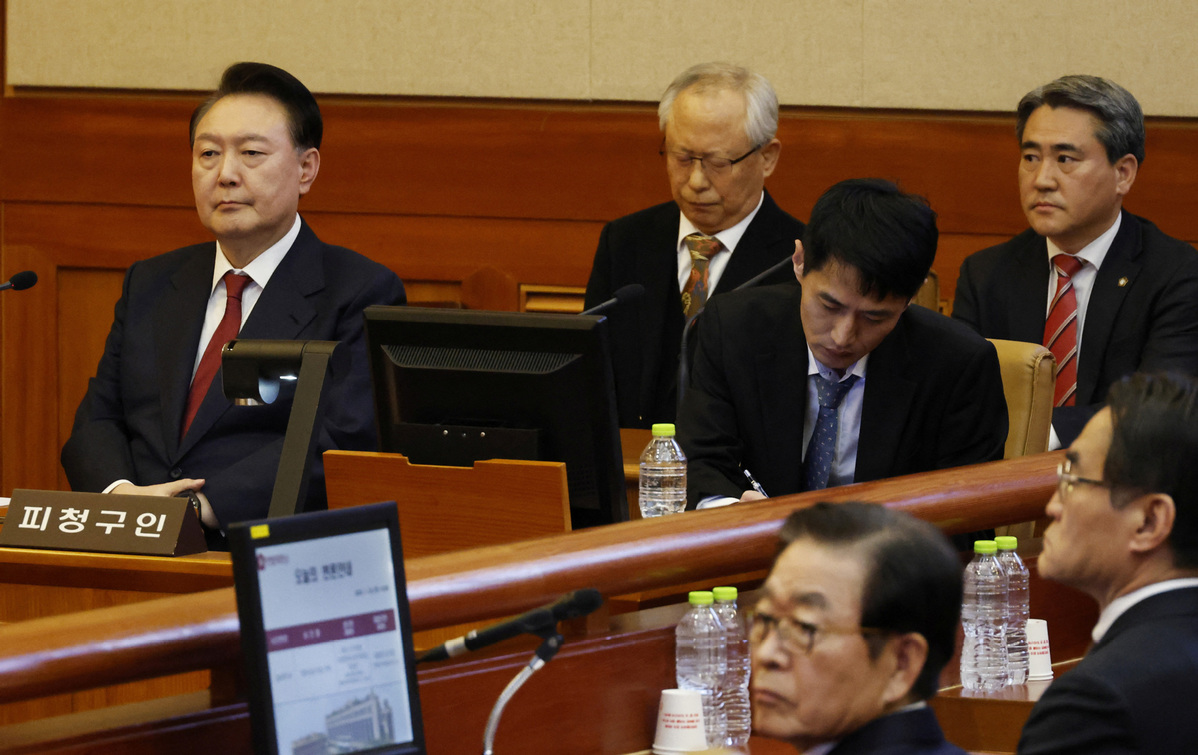
SEOUL -- South Korea's prosecution sought the extension of detention of the arrested President Yoon Suk-yeol until Feb 6 to carry out further investigation, multiple media outlets said Friday.
The prosecution's special investigative headquarters made the request to the Seoul Central District Court on Thursday, which was predicted to decide on the extension as early as Friday.
A warrant to keep Yoon in custody for up to 20 days, including the arrest period, was issued by another Seoul court on Jan 19.
The prosecution was widely expected to indict Yoon under detention for insurrection and other charges.
Yoon was apprehended in presidential office on Jan 15, becoming the country's first sitting president to be arrested.
The motion to impeach Yoon was passed through the National Assembly on Dec 14 last year and was delivered to the constitutional court to deliberate it for up to 180 days, during which Yoon's presidential power is suspended.
Yoon, who was named by investigative agencies as a suspected ringleader on insurrection charge, declared a martial law on the night of Dec 3, but it was revoked by the National Assembly hours later.
